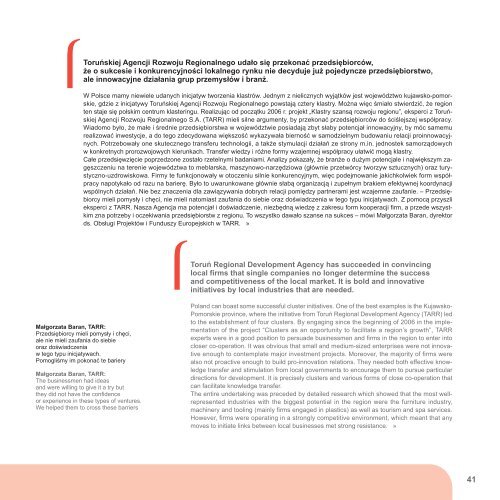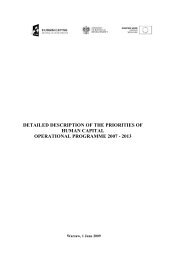European Social Fund in Poland: Best Practices - Europejski ...
European Social Fund in Poland: Best Practices - Europejski ...
European Social Fund in Poland: Best Practices - Europejski ...
You also want an ePaper? Increase the reach of your titles
YUMPU automatically turns print PDFs into web optimized ePapers that Google loves.
⎧Toruńskiej Agencji Rozwoju Regionalnego udało się przekonać przedsiębiorców,<br />
że o sukcesie i konkurencyjności lokalnego rynku nie decyduje już pojedyncze przedsiębiorstwo,<br />
ale <strong>in</strong>nowacyjne działania grup przemysłów i branż.<br />
W Polsce mamy niewiele udanych <strong>in</strong>icjatyw tworzenia klastrów. Jednym z nielicznych wyjątków jest województwo kujawsko-pomorskie,<br />
gdzie z <strong>in</strong>icjatywy Toruńskiej Agencji Rozwoju Regionalnego powstają cztery klastry. Można więc śmiało stwierdzić, że region<br />
ten staje się polskim centrum klaster<strong>in</strong>gu. Realizując od początku 2006 r. projekt „Klastry szansą rozwoju regionu”, eksperci z Toruńskiej<br />
Agencji Rozwoju Regionalnego S.A. (TARR) mieli silne argumenty, by przekonać przedsiębiorców do ściślejszej współpracy.<br />
Wiadomo było, że małe i średnie przedsiębiorstwa w województwie posiadają zbyt słaby potencjał <strong>in</strong>nowacyjny, by móc samemu<br />
realizować <strong>in</strong>westycje, a do tego zdecydowana większość wykazywała bierność w samodzielnym budowaniu relacji pro<strong>in</strong>nowacyjnych.<br />
Potrzebowały one skutecznego transferu technologii, a także stymulacji działań ze strony m.<strong>in</strong>. jednostek samorządowych<br />
w konkretnych prorozwojowych kierunkach. Transfer wiedzy i różne formy wzajemnej współpracy ułatwić mogą klastry.<br />
Całe przedsięwzięcie poprzedzone zostało rzetelnymi badaniami. Analizy pokazały, że branże o dużym potencjale i największym zagęszczeniu<br />
na terenie województwa to meblarska, maszynowo-narzędziowa (głównie przetwórcy tworzyw sztucznych) oraz turystyczno-uzdrowiskowa.<br />
Firmy te funkcjonowały w otoczeniu silnie konkurencyjnym, więc podejmowanie jakichkolwiek form współpracy<br />
napotykało od razu na barierę. Było to uwarunkowane głównie słabą organizacją i zupełnym brakiem efektywnej koordynacji<br />
wspólnych działań. Nie bez znaczenia dla zawiązywania dobrych relacji pomiędzy partnerami jest wzajemne zaufanie. – Przedsiębiorcy<br />
mieli pomysły i chęci, nie mieli natomiast zaufania do siebie oraz doświadczenia w tego typu <strong>in</strong>icjatywach. Z pomocą przyszli<br />
eksperci z TARR. Nasza Agencja ma potencjał i doświadczenie, niezbędną wiedzę z zakresu form kooperacji firm, a przede wszystkim<br />
zna potrzeby i oczekiwania przedsiębiorstw z regionu. To wszystko dawało szanse na sukces – mówi Małgorzata Baran, dyrektor<br />
ds. Obsługi Projektów i <strong>Fund</strong>uszy <strong>Europejski</strong>ch w TARR. »<br />
Małgorzata Baran, TARR:<br />
Przedsiębiorcy mieli pomysły i chęci,<br />
ale nie mieli zaufania do siebie<br />
oraz doświadczenia<br />
w tego typu <strong>in</strong>icjatywach.<br />
Pomogliśmy im pokonać te bariery<br />
Małgorzata Baran, TARR:<br />
The bus<strong>in</strong>essmen had ideas<br />
and were will<strong>in</strong>g to give it a try but<br />
they did not have the confidence<br />
or experience <strong>in</strong> these types of ventures.<br />
We helped them to cross these barriers<br />
⎧Toruń Regional Development Agency has succeeded <strong>in</strong> conv<strong>in</strong>c<strong>in</strong>g<br />
local firms that s<strong>in</strong>gle companies no longer determ<strong>in</strong>e the success<br />
and competitiveness of the local market. It is bold and <strong>in</strong>novative<br />
<strong>in</strong>itiatives by local <strong>in</strong>dustries that are needed.<br />
<strong>Poland</strong> can boast some successful cluster <strong>in</strong>itiatives. One of the best examples is the Kujawsko-<br />
Pomorskie prov<strong>in</strong>ce, where the <strong>in</strong>itiative from Toruń Regional Development Agency (TARR) led<br />
to the establishment of four clusters. By engag<strong>in</strong>g s<strong>in</strong>ce the beg<strong>in</strong>n<strong>in</strong>g of 2006 <strong>in</strong> the implementation<br />
of the project “Clusters as an opportunity to facilitate a region’s growth”, TARR<br />
experts were <strong>in</strong> a good position to persuade bus<strong>in</strong>essmen and firms <strong>in</strong> the region to enter <strong>in</strong>to<br />
closer co-operation. It was obvious that small and medium-sized enterprises were not <strong>in</strong>novative<br />
enough to contemplate major <strong>in</strong>vestment projects. Moreover, the majority of firms were<br />
also not proactive enough to build pro-<strong>in</strong>novation relations. They needed both effective knowledge<br />
transfer and stimulation from local governments to encourage them to pursue particular<br />
directions for development. It is precisely clusters and various forms of close co-operation that<br />
can facilitate knowledge transfer.<br />
The entire undertak<strong>in</strong>g was preceded by detailed research which showed that the most wellrepresented<br />
<strong>in</strong>dustries with the biggest potential <strong>in</strong> the region were the furniture <strong>in</strong>dustry,<br />
mach<strong>in</strong>ery and tool<strong>in</strong>g (ma<strong>in</strong>ly firms engaged <strong>in</strong> plastics) as well as tourism and spa services.<br />
However, firms were operat<strong>in</strong>g <strong>in</strong> a strongly competitive environment, which meant that any<br />
moves to <strong>in</strong>itiate l<strong>in</strong>ks between local bus<strong>in</strong>esses met strong resistance. »<br />
41




